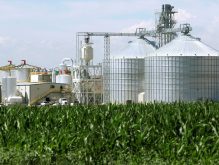CNS Canada — The climate of the Canadian renewable fuel market could shift when the U.S. Environmental Protection Agency finalizes its new targets, some industry professionals say.
Revised biofuel targets recently proposed by the EPA would reduce standards put in place in 2007.
The changes would adjust Renewable Fuel Standard (RFS) regulations by reducing volume mandates, and increasing them incrementally throughout following years.
The proposed changes would bring biofuel targets lower than what had already been set by Congress, but with the long-term goal of increasing renewable fuel use, the EPA said in its proposal announcement.
Read Also

CBOT Weekly: Additional soybean purchases strengthen U.S. soy
There were good gains for the Chicago soy complex during the week ended Feb. 4, due to positive news that Wednesday.
Patrick Girard, an Agriculture and Agri-Food Canada media relations officer, said the EPA’s proposed changes to RFS open up market certainty for Canadian biofuel and for feedstock producers exporting to the U.S.
“This recent ruling provides a signal to the sector about the U.S. government’s commitment to biofuels and the bioeconomy moving forward. These new targets are expected to help the biofuels industry in North America.”
Canadian Renewable Fuels Association president Andrea Kent called the EPA’s ethanol volume targets disappointing.
“The erosion of any renewable fuels policy in the U.S. is also not good for Canada. We operate in a North American fuel market; any policy that could curtail investment in biofuels projects has effects on both sides of the border,” Kent said via email.
The U.S. has proposed percentage standards with separate targets for each renewable fuel type, including advanced biofuel.
Political scientist Grace Skogstad of the University of Toronto has researched biofuel regulations in the European Union, U.S. and Canada. If the U.S. isn’t going to blend as much advanced biofuel, she said, that might reduce incentive for other countries to produce it.
“You need to have a market for this because it’s not really economically profitable unless you can be guaranteed that you have a market to sell your product into.”
Reducing the volume of advanced biofuel that needs to be blended sends the wrong signals, Skogstad said.
“If we’ve got advanced biofuels to sell into the U.S. and they’ve got a lower target then obviously that’s not good news for us, because there’s more people that are competing for that market.”
Ethanol is an alcohol-based biofuel produced from plant sugars, starches or cellulose. Biodiesel is a renewable fuel made from oil, fat or grease. Advanced biofuel, or second-generation biofuel, is made from lignocellulosic biomass — dry plant matter, such as wood.
Canada’s renewable fuels regulations do not call for advanced biofuel volume targets like the U.S.
Canada is not considering making policy changes to biofuel regulations, AAFC’s Girard said.
In addition to the new targets, the U.S. has also said it would provide US$100 million for ethanol blending pumps to be installed at service stations.
Girard said he cannot speak to potential future program or policy changes in Canada regarding funding.
Canadian renewable fuel regulations today require an average of two per cent renewable content in diesel fuel and heating oil, and an average of five per cent renewable fuel content in gasoline based on volume.
— Jade Markus writes for Commodity News Service Canada, a Winnipeg company specializing in grain and commodity market reporting.















